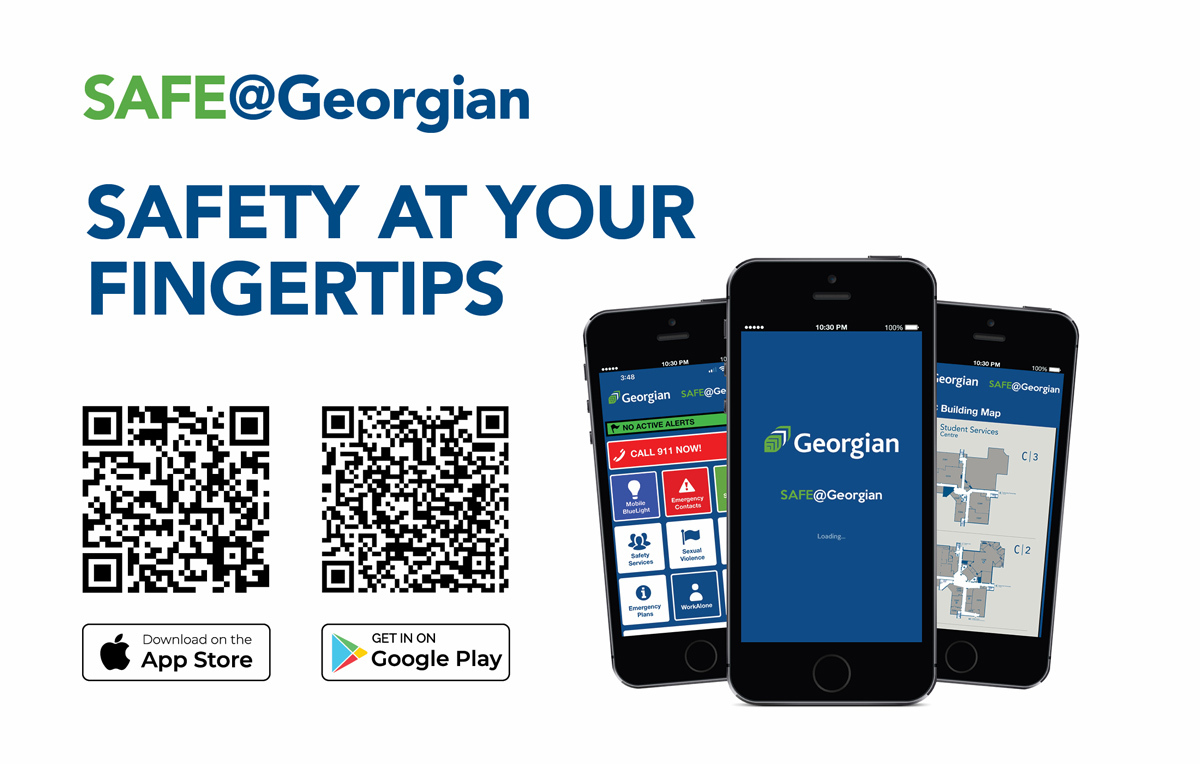Conflict Resolution and Investigations
Campus Safety Services assists the college in resolving a variety of conflicts that may arise involving students and/or staff. The Conflict Resolution and Investigations team uses a variety of tools to address conflict and achieve a resolution that maintains Georgian’s standard of a safe, respectful and inclusive learning and working environment.
About the Conflict Resolution and Investigations team
The Conflict Resolution and Investigations (CRI) team works in collaboration with many other areas of the college, including Academics, Counselling Services and the Office of the Registrar Office, to address a conflict or to resolve a concern from a student or employee.
All community members are welcome to confidentially consult with the CRI team at any time regarding a concern they may have in relation to another community member or area of the college. We can provide guidance on how to resolve a concern informally, which may involve the conduct of another community member or a challenge you’re facing with another college department. Additionally, we can also provide options available under a number of policies in order to help you determine the best approach to address your concern.
We also work closely with Georgian’s security team to assist community members with other safety concerns they may have (e.g., homelessness, conflicts in personal lives, personal safety concerns and safety planning).

Policies and procedures that guide CRI at Georgian
Formally, the CRI team plays an investigative role under the Student Code of Conduct, Employee Code of Conduct, Sexual Violence Procedure, Human Rights and Anti-Discrimination Policy and the Protective Disclosure Policy.
Investigations are carried out through a neutral and fair fact-finding process. Staff, faculty and/or students may be interviewed for various reasons during an investigative process. The confidential information gathered during an investigation is used to facilitate a resolution to the matter being reviewed. Resolutions can include informal discussions, referrals to other college or community resources, mediations and/or formal remedies and sanctions under the relevant college policy.
The Student Code of Conduct outlines the process for Georgian to formally address concerns that are brought forward about a student. We create a neutral, safe space for the complainant to share concerns, allow them to ask questions, offer some advice, and support and present options.
If the complainant chooses to make a formal complaint, an investigation may be conducted. However, where appropriate, every effort will be made to assist in the facilitation of an informal resolution. If an investigation is required, it’ll be conducted by a CRI team member.
The goal of any investigation is to find out what happened, who was involved, how were they impacted, and whether it was appropriate behaviour as set out in the Student Code of Conduct. A respondent, the person who potentially committed an act of misconduct, would be informed of the complaint and given an opportunity to share their point of view.
At the end of an investigation, a finding is made, on a balance of probabilities, regarding what happened and if a misconduct occurred. Throughout this process, there are many meetings and opportunities for those directly involved to be informed and updated, with safety being a top priority. We work with those involved in the investigation to find a resolution and at times, this may include the a sanction.
Similar to the Student Code of Conduct, the Employee Code of Conduct outlines the process for resolving complaints and conflicts of misconduct involving an employee.
If a student or staff member feels there has been an act of misconduct directed towards them by a college employee, they have the option to consult with the CRI team. We create a neutral, safe space for the complainant to share concerns, allow them to ask questions, offer some advice and support, and present available options. Employees also have the option of discussing their concerns with their direct manager or a human resource consultant, where appropriate.
If the complainant chooses to make a formal complaint, an investigation may be conducted. However, where appropriate, every effort will be made to assist in the facilitation of an informal resolution. If an investigation is required, it’ll be conducted by a CRI team member.
The goal of any investigation is to find out what happened, who was involved, how were they impacted, and whether it was appropriate behaviour as set out in the Employee Code of Conduct. A respondent, the person who potentially committed an act of misconduct, would be informed of the complaint and given an opportunity to share their point of view.
At the end of an investigation, a finding is made, on a balance of probabilities, regarding what happened and if a misconduct occurred. These findings are then reported back to Human Resources.
Georgian’s Board of Governors has invoked a protective disclosure (whistleblower) policy to ensure there’s a procedure in place that allows for the reporting of any wrongdoings to be investigated appropriately.
If any member of the college reasonably knows or believes there has been activity that is covered by this procedure, they may file, in confidence, a disclosure with Dave Truax, Executive Director of Campus Safety Services by calling 249.388.1925, or Leanne Jackson, Manager of Conflict Resolution and Investigations by calling 249.388.0290.
Georgian is committed to fostering a diverse and inclusive working and learning environment that is free from any form of harassment, discrimination and bullying.
All members of the college community have the right to learn and work in a safe and respectful environment. Georgian upholds the position of the Ontario Human Rights Code, which states that its public policy in Ontario is to recognize the dignity and worth of every person, and to provide for equal rights and opportunities without discrimination on certain prohibited grounds.
A complaint of sexual violence can be made by any member of the Georgian community. If there’s an immediate safety risk, please call 911.
At Georgian, we’re committed to assisting and supporting survivors in a manner that respects the rights of the survivor to choose how they want to proceed. The CRI team provides a safe place for survivors to confidentially discuss the options, supports and resources available to them at Georgian and in their local community.
If you have knowledge of, have witnessed, or have reason to believe an incident of sexual violence has occurred, it’s necessary to connect the survivor with either Counselling Services or Campus Safety Services right away. Please don’t gather details from a survivor about their experience. Ensure they’re safe for the time being, listen empathetically and without judgement, but then offer to connect them with those at the college who can extend supports and help them re-establish a sense of safety.
Counselling and Campus Safety Services will ensure the survivor is informed of their reporting options, connected to supports, offered safety planning and emergency assistance, and referred to other areas as appropriate.
The purpose of the Student of Concern Committee (SOCC) is to collaborate with campus departments, faculty and staff to provide support to at-risk students by way of early intervention.
Both the executive director, Campus Safety Services and the manager, Conflict Resolution and Investigations are members of the SOCC. Any student that is displaying behaviours of concern in terms of their personal, physical, emotional or mental well-being should be referred to SOCC as a first point of contact in order to provide the help and supports the student requires.
What can CRI help with?
Contact the CRI team about:
- a situation or conflict that has already been responded to by appropriate authorities (e.g., campus security, police) or involved college departments (e.g., Counselling, Student Success, your program area, etc.) but continues to be unresolved
- situations in which people involved are currently safe but may need ongoing support to maintain their safety and/or ability to engage in learning, teaching or working
- process options, advice and consultations related to Georgian’s Student Code of Conduct, Employee Code of Conduct, Human Rights and Anti-Discrimination Policy, Sexual Violence Procedure, and the Protective Disclosure (Whistleblower) Policy, among others
In doubt about your options or next steps?
Consult the CRI team sooner rather than later.
Often, there are multiple options and measures that can be implemented to give you time and support to make informed choices about how to engage in a resolution process.
Report a conflict and discuss next steps

Book an appointment
If you’re ready to discuss your experience and concerns, please connect with Rebecca Pappas, Conflict Resolution and Investigations Administrator, to book an intake appointment:
During the appointment, you’ll have an opportunity to explain what you’ve experienced, what your concerns are, ask questions and gather information about what process options you’ll have if you decide you want to move forward with us to resolve your concerns.
If you don’t wish to proceed with a formal complaint, there are other options CRI can assist you with in order to ensure you continue to feel safe in your working and learning environment. We’re here to help!
Confidentiality and disclosure of information
Intake appointments
The intake discussion with CRI is private and confidential.
Formal complaints
If you decide to move forward with a formal complaint about someone, CRI will present your concerns or complaint to the respondent so they can provide their perspective on what occurred. This involves sharing with them sufficient details so that they understand the allegation and can respond fully.
CRI does not disclose confidential information about an investigation to outside parties (including uninvolved faculty, staff and students) unless it’s legally required or necessary to ensure the safety and well-being of those involved in a case.
Files
All files involving a complaint or investigation are kept in a secure and separate database maintained by Campus Safety Services. This database is separate from your academic record and is only accessible by certain members of the Campus Safety Services team.
Interview process for respondents and witnesses

Obligation to participate
To investigate formal complaints, CRI may contact respondents and/or witnesses for an interview.
It’s the obligation of all staff, faculty and students to co-operate with any investigative process conducted by our office. The information we obtain from you is private and confidential.
If you have concerns about participating in an investigation, it’s still important that you respond to any inquiries from CRI. Our team will be happy to discuss any questions or concerns you may have about participating in an investigation.
Implications of CRI matters
Academic records and progress
If you’re sanctioned via a Student Code of Conduct process, depending on the sanction, your academic progress could be interrupted, specifically if you’re sanctioned by way of a suspension, expulsion or prohibition.
These sanctions are rarely used but at times, may be appropriate, given the seriousness of the misconduct.
Repercussions
Any reprisal or consequence experienced by a participant of an investigation from an outside party including classmates or coworkers, managers or faculty should be immediately reported to CRI.
Any reprisal for participating in an investigation will be taken seriously by CRI and may result in a sanction against that person.
Frequently asked questions (FAQs)
Security
Call campus security using the Safe@Georgian app or from any on-campus phone by dialing 705.722.4000 when:
- there is a conflict or disruption happening right now
- you’re concerned that a student or employee is presently unsafe, in distress or is expressing thoughts of suicide or self-harm
- you feel something or someone poses a threat to the health, safety and well-being of community members or the campus as a whole
Conflict Resolution and Investigations
Contact CRI about:
- a situation or conflict that has already been responded to by appropriate authorities (e.g., campus security, police) or involved college departments (e.g., Counselling, Student Success, your program area, etc.) but continues to be unresolved
- situations in which people involved are currently safe but may need ongoing support to maintain their safety and/or ability to engage in learning, teaching or working
- process options, advice and consultations related to Georgian’s Student Code of Conduct, Employee Code of Conduct, Human Rights and Anti-Discrimination Policy, Sexual Violence Procedure, and the Protective Disclosure (Whistleblower) Policy, among others
If in doubt about your options or next steps, consult with CRI sooner rather than later. Often, there are multiple options and measures that can be implemented that will give someone time and support so they can make informed choices about how they want to engage in a resolution process.
Please connect with Rebecca Pappas, Conflict Resolution and Investigations Administrator, by email to book an intake appointment.
During an intake discussion, you’ll have the opportunity to explain what you’ve experienced, what your concerns are, ask questions, and gather information about what process options may be open to you if you decide you want to move forward with us in resolving your concerns.
This conversation is private and confidential.
CRI will present your concerns or complaint to the respondent so that they can provide us with their perspective on what occurred. This involves sharing with them sufficient details so they understand the allegation and can respond fully.
CRI doesn’t disclose confidential information about an investigation to outside parties (including uninvolved faculty, staff and students) unless it’s legally required or necessary to ensure the safety and well-being of those involved in a case.
If you don’t wish to move forward with a complaint, there are other options CRI can assist you with in order to ensure you continue to feel safe in your working and learning environment.
Yes. Providing all details is essential in order for us to fully understand what happened and how we can help.
Providing all details to CRI means that you’re enabling our team to help identify the most appropriate resolution strategy. Your open discussion about all that occurred facilitates a timely resolution, ensures that all safety factors are accounted for, and can lessen the disruption or interruption experienced by those involved.
You can talk to us!
All concerns relating to the conduct or performance of any employee, including staff or faculty, are addressed under our Employee Code of Conduct.
CRI partners with Human Resources and an employee’s direct manager in order to address your concerns.
Yes. It’s the obligation of all staff and students to co-operate with any investigative process conducted by our office. The information we obtain from you is private and confidential.
If you have concerns about participating in an investigation, it’s still important that you respond to any inquiries from CRI. Our team is happy to discuss any questions or concerns you may have about participating in an investigation.
All conversations with CRI are private and confidential.
Any reprisal or consequence experienced by a participant of an investigation from an outside party including classmates or coworkers, managers or faculty should be immediately reported to CRI.
Any reprisal for participating in an investigation will be taken seriously by CRI and may result in a sanction against that person.
All files involving a complaint or investigation are kept in a secure and separate database maintained by Campus Safety Services.
This database is separate from your academic record and is only accessible by certain members of the Campus Safety Services team.
Campus Safety Service files are kept securely in a separate database from your academic record.
If you’re sanctioned via a Student Code of Conduct process, depending on the sanction, your academic progress could be interrupted, specifically if you’re sanctioned by way of a suspension, expulsion or prohibition. These sanctions are rarely used but at times, may be appropriate, given the seriousness of the misconduct.
If a conflict could potentially impact the classroom environment or has already led to a disruption in the classroom, your faculty, program co-ordinator and associate dean will be informed throughout the conflict resolution or investigation process, as well as the outcome of any process we undertake.
In most cases, no. The processes we have at Georgian to address conflict and problems are internal college processes and have no impact on the decisions made by non-collegial authorities such as immigration, police departments, the court system or external employers.
The exceptional situation would be where a community member engages in conduct that might be deemed criminal by provincial or federal courts. Georgian does not call immigration or border services, police services, or non-collegial partnering employers to report that a student or staff was found to have engaged in misconduct under one of our codes.
Please follow up with Leanne Jackson, Manager of Conflict Resolutions and Investigations to ask about your process rights, which may include:
- initiating an appeal of a finding under one of our college codes
- being connected with collegial decision-makers
- obtaining next steps information
Email Leanne or call 249.388.0290.
Safe@Georgian app
Keep us in your pocket! The Safe@Georgian mobile app provides quick and easy access to emergency contacts, support resources and much more.
App features
- One touch connection to local police, campus security, safety escort request line, conflict resolution, and mental health and well-being supports
- Mobile Blue Light will send a ping with your location to security and provide your phone number so they can contact you when you are not feeling safe
- Campus maps
- Important notifications (e.g., lockdown, fire, unscheduled campus closures, etc.)
- Sexual violence resources and information
- Report suspicious activity

Contact us
Have a general question about conflict resolution at Georgian?
Please email us at conflictresolution@georgiancollege.ca or call 705.722.1586.
For further information, you can contact:


April Nietzschmann
Conflict Resolution Coordinator
Conflict Resolution and Investigations
Phone: 249.388.0322
Email: Email April

Rebecca Pappas
Conflict Resolution and Investigations Administrator
Conflict Resolution and Investigations
Phone: 249.388.0354
Email: Email Rebecca

Meghan MacDonald
Conflict Resolution Coordinator
Conflict Resolution and Investigations
Phone: 249.388.2352
Email: Email Meghan
